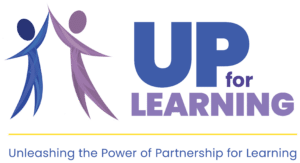UP’s Program Director Katie Ingraham and Youth Program Specialists Lola Fanning, Isis Bandele-Asante and Kiera Bourne-Bey have been facilitating a group of high school students from Black Student Unions across the state of Delaware in their Youth Participatory Action Research Projects. This week, UP’s Communication Director Christie Beveridge sat down with Katie to hear highlights from the team’s work this year. The following are excerpts from their conversation.
Tell me about the team and its origins:
The United Way of Delaware (UWDE) works with students year-round. They put on three statewide teen-led youth summits hosting over 1,000 Delaware students, advisors, and superintendents. UWDE was asked by the Delaware Department of Education to be a thought partner and leader in continuing to create power sharing, equity-driven models of collaboration and thought leadership with students. They partnered with UP with the goal of connecting members of Black Student Unions across the state to engage in YPAR projects rooted in their home communities and supported by this cohort of students. About 20 youth from across Delaware are involved, and they meet virtually every other week. Youth are developing their critical awareness and creating research designs that come from their interests and their communities’ needs. Currently, they are in the data-collection phase of the YPAR process. Their projects aim to address microaggressions in schools and the lack of representation of Black students in Advanced Placement classes, to build healthy equity for Black communities, to increase cultural awareness among staff and students, and many more.
What have been some highlights of working with this team?
One highlight has been experiencing the process of getting into the flow of a regular virtual gathering space. Youth facilitators are both leading and participating in projects and are navigating both roles so gracefully. Another highlight has been hearing about such different and diverse projects rooted both in students’ interests and systemic inequities. The team has connected so many youth across the state so that they can support each other and strengthen each others’ projects. Lastly, connecting with and building partnership with the UWDE has been very rewarding and collaborative.
What have been some challenges the team has experienced?
Due to a couple of factors we couldn’t get started until later in the school year. This has required the group to engage in an accelerated YPAR process. There has been a limited amount of time to collect data due to how much longer schools are in session. The youth need access to their peers at school to complete meaningful data collection. Projects will run into the summer where students will be able to participate in data analysis and action rooted in their project areas. At first it was tricky to create deep community and vulnerability on the virtual platform. Many haven’t been on Zoom since the pandemic. The group has found lots of comradery, collaboration, and connection over the course of our meetings and the students building their comfortability with the virtual platform.
What are the team’s next steps?
The youth are continuing to move through the YPAR process. They are analyzing data they’ve collected and thinking about how to share their findings with their communities. After that, they will engage with and find allies to support them in whichever actions they want to enact. They are planning an in-person event at the end of June to celebrate their work. Our hope is we can turn the students’ research into actionable steps to change their communities for the better.

